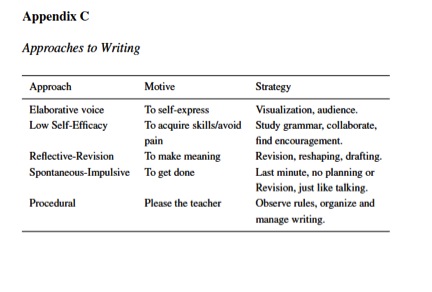The writers we work with at the UCWbL are much like snowflakes, in that no two are alike and they both can be seen covering the sidewalks of the Lincoln Park campus. They are also like a secret agent’s undercover assignment, in that we must be ready to change our approach at any moment to achieve our objective of collaborative learning. Though the papers we work on may occasionally be similar in structure or objective, each individual appointment contains its own challenges, goals, and personal learning styles.
Understanding that different styles of writing exist is only the initial step in our continuous quest for ultimate writing tutor effectiveness. Knowing how to be flexible and tailor your tutoring approach to each writer’s personal needs is something else altogether, a skill that needs to be developed with an awareness of what types of student writers might come to us for help
When meeting with writers, I always start by trying to get an idea of how each individual writes best. Questions like, “How did you feel about writing this draft?” or “Where do you normally like to get started when working on essays?” can grant a bit of perspective into a writer’s particular methodology.
Fortunately for us UCWbLrs, there happens to be some academic study on how different students at a university level can approach writing. Writing center academics Ellen Lavelle and Nancy Zuercher conducted research that revealed five distinct factors visible in undergraduate writing . The academic study, appropriately titled “The Writing Approaches for University Students,” lists how a writer with a close relationship to each factor would be motivated and what strategy for writing they would find most effective.

Lavelle and Zuercher utilize these factors to address the different approaches undergraduate writers tend to take, but we can use them to help us keep in mind where our writers are coming from and adapt our tutoring styles accordingly.
For example, a procedural writer is one who is motivated by doing things the way the teacher wants them to be done. It is unlikely that a very procedural writer will go anywhere beyond exactly what is expected of them in the assignment prompt. They will likely struggle with incorporating outside ideas into their essays, and can consequently have some trouble working with a peer tutor who may be more accustomed to using an unconventional approach to their own tutoring.
According to the study, a procedural writer will innately do their best to observe the rules of the assignment. When working with a writer such as this, it can be beneficial to tie your discussion of the paper back into the professor’s original prompt. Make frequent mention of the professor’s expectations, and do your best to reassure the writer that they can always think outside of the box, even when it comes to academic papers.
Much like a secret agent, us UCWbLr’s must be ready to change our disguises for every different type of situation. Next time you find yourself conflicted on how to work with a new appointment, just think to yourself “What would James Bond do?”
If you are interested in reading more, feel free to download the article by clicking on the link below.
Undergraduate Approaches to Writing
Discover more from UCWbLing
Subscribe to get the latest posts sent to your email.


One reply on “James Bond and Flexibility at the UCWbL”
Thanks for sharing this article, Daniel! I agree that understanding someone’s motivations is key to creating an effective, customized approach to tutoring. It’s interesting to me that how we write could give insight into our motivations. What a great starting point for asking questions and listening carefully. I also think working with others to understand their motivations can help with our Stephen North inspired goal to help make better writers along with better writing.